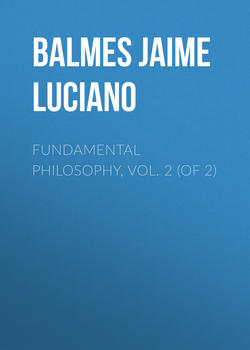Читать книгу Fundamental Philosophy, Vol. 2 (of 2) - Balmes Jaime Luciano - Страница 13
BOOK FOURTH.
ON IDEAS
CHAPTER XIII.
EXISTENCE OF PURE INTELLECTUAL INTUITION
Оглавление83. It is not true that the human mind even in this life has no intuition other than the sensible. There are within us many non-sensible phenomena, of which we are clearly conscious. Reflection, comparison, abstraction, election, and all the acts of the understanding and will, include nothing of the sensible. We should like to know, to what species of sensibility, abstract ideas, and the acts by which we perceive them, belong; these among others: I desire, I do not desire, I choose this, I prefer this to that. Not one of these acts can be presented by sensible intuition; they are facts of an order superior to the sphere of sensibility, and yet we have in our mind a clear and lively consciousness of them; we reflect upon them, make them the object of our studies, distinguish them one from another, and classify them in a thousand different ways. These facts are presented to us immediately; we know them, not by discursion, but by intuition; therefore it is false that the intuition of the soul refers to none but sensible phenomena, for it encounters within itself an expanded series of non-sensible phenomena, which are given to it in intuition.
84. It is of no use to say that these internal phenomena are empty forms, and mean nothing, unless referred to a sensible intuition. Whatever they may be, they are something distinct from this same sensible intuition; and we perceive this something, not by discursion, but by intuition; therefore, besides sensible intuition, there is another of the purely intellectual order.
The question is not whether these pure conceptions have, or have not, a certain power to enable us to know objects in themselves; but it is simply to ascertain if they do exist, and if they are sensible. That they exist, is certain; consciousness attests this fact, and all ideologists admit it. That they are sensible, cannot be maintained without destroying their nature; and least of all can Kant maintain this, since he has so carefully distinguished between sensible intuition and these conceptions.
85. This sea of non-sensible phenomena, which we experience within us, is like a mirror wherein the depths of the intellectual world are reflected. Minds, it is true, are not presented immediately to our perception, and to know them we need a discursive process; but we shall, upon careful examination, find in this intuition of our inward phenomena the representation, imperfect though it be, of what is verified in intelligences of a superior order. Thus we have in a certain mode idea-images, since there can be no better image of one thought than another thought, nor of one act of the will than another act of the will. Thus we know minds distinct from our own, by a kind of mediate, not immediate, intuition, in so far as they are presented to our consciousness as the image in a mirror.
86. The communication of minds by means of speech and other natural or conventional signs, is a fact of experience intimately connected with all intellectual, moral, and physical necessities. When a mind is put into communication with another, the cognition it has of what passes in the other is not by mere general conceptions, but by a kind of intuition, which although mediate, does not therefore fail to be true. The thought, or affection of another communicated to our mind by means of speech, excites in us a thought, or affection, similar to that of the mind communicating them. We do, then, not only know, but see, in our own consciousness, the consciousness of another; and so perfect is at times the likeness, that we anticipate all that he is about to tell us, and unroll within ourselves the same series of phenomena that are verified in the mind of him with whom we are in communication. It happens thus when we say: "I understand perfectly what N. thinks, what he wants, what he is trying to express."
87. This observation seems to us of great service to place beyond all doubt that there are in our mind, independently of the sensible order, conceptions, not empty, but referable to a determinate object. The cognition of the phenomena of the purely intellectual order, transmitted to us by means of speech, or other signs, does not destroy the character of the intuition, since we here find all the necessary conditions assembled; internal representation, and its relation to a determinate object affecting us.
88. This analysis of ideological facts, whose existence cannot be doubted, demonstrates the falseness of Kant's doctrine, that there are in our mind none but sensible intuitions; as well as the non-existence of the German philosopher's problem: whether it is possible, or not, for objects to be given to other minds in an intuition other than the sensible. This very problem is found solved within us, since the attentive observation of the internal phenomena, and the reciprocal communication of minds, has given us to know not only the possibility, but also the existence of intuitions different from the sensible.
